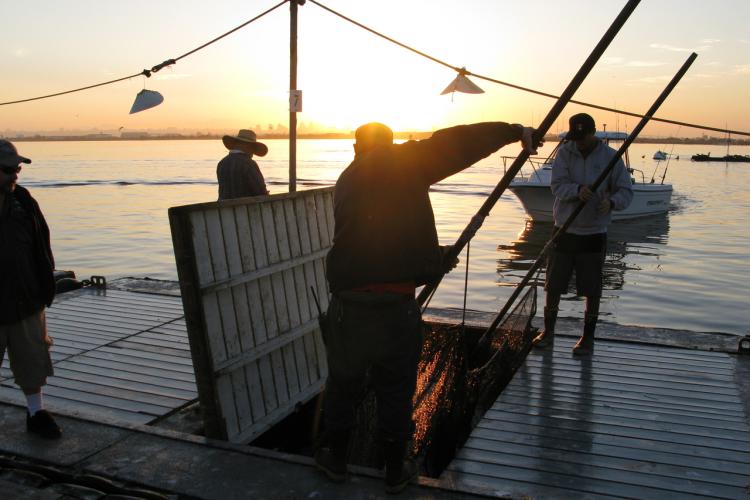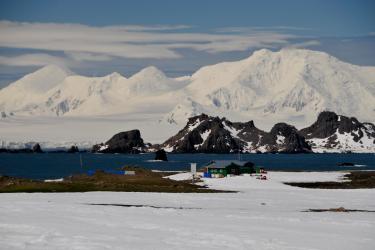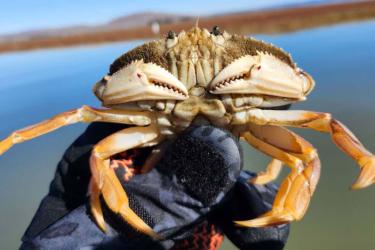The primary goal of the Economics and Human Dimensions Program is to conduct research and inform fisheries management in support of the West Coast Geographic Strategic Plan goals of amplifying the economic value of commercial and recreational fisheries while ensuring their sustainability and helping conserve and recover protected species while supporting responsible fishing and resource development.
Conservation and Management
Our program focuses on the conservation and management of international tuna fisheries, domestic Highly Migratory Species and Coastal Pelagic Species fisheries, marine recreational fisheries, and protected species. Members serve in National Marine Fisheries Service’s seats on the Pacific Fishery Management Council Highly Migratory Species Management Team, Coastal Pelagic Species Management Team, and Climate and Communities Core Team, and the National Marine Fisheries Service Recreational Fisheries Engagement Initiative for West Coast Recreational Fisheries. Team members serve in open seats on several science advisory boards, such as the Scientific Committee of International Seafood Sustainability Foundation, the International Pole and Line Foundation, the Pacific Fishery Management Council’s Ad Hoc Climate and Communities Core Team, and Inter-American Tropical Tuna Commission’s Fish Aggregating Device Working Group. Members also serve in the Southwest Fisheries Science Center's seats on the Pacific Coast Fisheries Data Committee.
Data Collection and Analysis
A primary activity of our program is the collection and analysis of data to document the economic status of commercial and recreational fisheries. In this role, program scientists design and conduct data collections, perform empirical economics analyses, produce manuscripts, and contribute to fisheries management reports. Examples of management reports include evaluations of alternative management measures in Pacific Fishery Management Council briefing book reports, and analyses for the National Environmental Policy Act, Regulatory Flexibility Act Analyses and Regulatory Impact Reviews.
Collaborative Efforts
We coordinate with the National Marine Fisheries Service Office of Science and Technology, the West Coast and Pacific Island National Marine Fisheries Service Regional Offices, the Pacific Islands Science Center, the Northwest Fisheries Science Center, the Pacific States Marine Fisheries Commission, the Office of International Affairs, and the Department of State.
Our program hosts visiting researchers and graduate students that are focused on fisheries issues pertinent to the program's mission. In part due to our proximity to the University of California at San Diego, we frequently collaborate with the University of California at San Diego’s Scripps Institution of Oceanography, Graduate School of International Relations and Pacific Studies, and Department of Economics through conducting joint research, serving on Ph.D. and M.A. and M.S. committees, teaching, and participating in seminars. The program has also collaborated with and/or mentored researchers from academic and research institutions including: San Diego State University, Columbia University, Duke University, Oxford, University of California at Berkeley, University of California at Santa Cruz, Australian National University, University of Queensland, Monash University, World Fish Center, World Bank, International Whaling Commission, International Seabed Authority, Inter-American Development Bank, Food and Agriculture Organization of the United Nations, Organization of Economic Cooperation and Development, Norwegian School of Economics and Business Administration, University of Southeastern Norway, and the University of Stavanger (Norway).
Coastal Pelagic Species
West Coast coastal pelagic species fisheries include those targeting jack mackerel, market squid, Northern Pacific anchovy, Pacific mackerel, and Pacific sardine. Research topics include fishery productivity, economic contribution of the fishery, and its importance to recreational fisheries.
Ecosystems Analysis and Management
Integrated environmental, ecological and economic modeling of the California Current Large Marine Ecosystem: We construct an integrated, multi-species, ecosystem-economic model of the California Current Large Marine Ecosystem to investigate the multispecies issues related to the role sardine play as forage in the California Current Large Marine Ecosystem.
Value of Sardine as Forage: We investigate the economic and ecological issues associated with the Pacific sardine as a commercially harvested species, relative to its importance as prey for species of commercial, recreational and ecological significance.
Climate Change and Forage Fish: We incorporate relevant environmental factors into the ecological-economic modeling framework to enhance its predictive and dynamic capabilities, particularly with regard to different climate change scenarios.
Aquaculture: We investigate interrelations between aquaculture and fisheries in the context of a system consisting of a Pacific sardine, a forage fish which is also harvested for human consumption and as an aquafeed, and a predator.
Highly Migratory Species
Highly migratory species include those which target tunas, billfish, and highly migratory shark species. Our program work includes:
- an economic viability study of highly migratory species fisheries on the productivity of West Coast commercial fisheries, a consumer seafood market study utilizing scanner data, and a Saltonstall-Kennedy Grant-funded project to scope the development of a seafood auction in San Diego. We work to support strategic goal.
- research projects on the economics of endangered species conservation, the transfer effect and the impact of bycatch regulation on economic and conservation performance of fisheries.
International Fisheries
International fisheries include those prosecuted all or in part outside of the west coast Exclusive Economic Zone and/or on a transboundary resource stock. Many highly migratory species and coastal pelagic species Fisheries Management Plan fisheries are at least partially international in operation. In addition, some U.S. fisheries operate entirely in international waters, such as the Western Pacific tuna fleet operating out of Samoa. Program economists support the Pacific Islands Regional Office, NOAA Fisheries Office of International Affairs, U.S. Department of State, American Tunaboat Association, and other U.S. institutions and agencies through economic advice. Statutory responsibilities include Marine Mammal Protection Act, Endangered Species Conservation and international treaty obligations.
Protected Species
Collaborative work with sea turtle scientists in the Marine Mammal and Turtle Division led to the Shallow Set and Leatherback Utilization of Temperate Habitat initiative.
West Coast Recreational Fisheries
Conduct data collection and economic analysis on the recreational fishing industry and recreational anglers. Recreational fisheries under focus include the California Commercial Passenger Fishing Vessel fleet, private boat based recreational fishing, and shore based recreational fishing. Research topics include the demand modeling, non-market valuation studies, and economic impact estimation.


